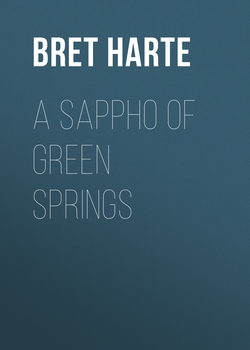Читать книгу A Sappho of Green Springs - Bret Harte - Страница 5
A SAPPHO OF GREEN SPRINGS
CHAPTER V
ОглавлениеIt is to be presumed that the editor and Mr. Hamlin mutually kept to their tacit agreement to respect the impersonality of the poetess, for during the next three months the subject was seldom alluded to by either. Yet in that period White Violet had sent two other contributions, and on each occasion Mr. Hamlin had insisted upon increasing the honorarium to the amount of his former gift. In vain the editor pointed out the danger of this form of munificence; Mr. Hamlin retorted by saying that if he refused he would appeal to the proprietor, who certainly would not object to taking the credit of this liberality. “As to the risks,” concluded Jack, sententiously, “I’ll take them; and as far as you’re concerned, you certainly get the worth of your money.”
Indeed, if popularity was an indiction, this had become suddenly true. For the poetess’s third contribution, without changing its strong local color and individuality, had been an unexpected outburst of human passion—a love-song, that touched those to whom the subtler meditative graces of the poetess had been unknown. Many people had listened to this impassioned but despairing cry from some remote and charmed solitude, who had never read poetry before, who translated it into their own limited vocabulary and more limited experience, and were inexpressibly affected to find that they, too, understood it; it was caught up and echoed by the feverish, adventurous, and unsatisfied life that filled that day and time. Even the editor was surprised and frightened. Like most cultivated men, he distrusted popularity: like all men who believe in their own individual judgment, he doubted collective wisdom. Yet now that his protegee had been accepted by others, he questioned that judgment and became her critic. It struck him that her sudden outburst was strained; it seemed to him that in this mere contortion of passion the sibyl’s robe had become rudely disarranged. He spoke to Hamlin, and even approached the tabooed subject.
“Did you see anything that suggested this sort of business in—in—that woman—I mean in—your pilgrimage, Jack?”
“No,” responded Jack, gravely. “But it’s easy to see she’s got hold of some hay-footed fellow up there in the mountains with straws in his hair, and is playing him for all he’s worth. You won’t get much more poetry out of her, I reckon.”
Is was not long after this conversation that one afternoon, when the editor was alone, Mr. James Bowers entered the editorial room with much of the hesitation and irresolution of his previous visit. As the editor had not only forgotten him, but even, dissociated him with the poetess, Mr. Bowers was fain to meet his unresponsive eye and manner with some explanation.
“Ye disremember my comin’ here, Mr. Editor, to ask you the name o’ the lady who called herself ‘White Violet,’ and how you allowed you couldn’t give it, but would write and ask for it?”
Mr. Editor, leaning back in his chair, now remembered the occurrence, but was distressed to add that the situation remained unchanged, and that he had received no such permission.
“Never mind THAT, my lad,” said Mr. Bowers, gravely, waving his hand. “I understand all that; but, ez I’ve known the lady ever since, and am now visiting her at her house on the Summit, I reckon it don’t make much matter.”
It was quite characteristic of Mr. Bowers’s smileless earnestness that he made no ostentation of this dramatic retort, nor of the undisguised stupefaction of the editor.
“Do you mean to say that you have met White Violet, the author of these poems?” repeated the editor.
“Which her name is Delatour,—the widder Delatour,—ez she has herself give me permission to tell you,” continued Mr. Bowers, with a certain abstracted and automatic precision that dissipated any suggestion of malice in the reversed situation.
“Delatour!—a widow!” repeated the editor.
“With five children,” continued Mr. Bowers. Then, with unalterable gravity, he briefly gave an outline of her condition and the circumstances of his acquaintance with her.
“But I reckoned YOU might have known suthin’ o’ this; though she never let on you did,” he concluded, eying the editor with troubled curiosity.
The editor did not think it necessary to implicate Mr. Hamlin. He said, briefly, “I? Oh, no!”
“Of course, YOU might not have seen her?” said Mr. Bowers, keeping the same grave, troubled gaze on the editor.
“Of course not,” said the editor, somewhat impatient under the singular scrutiny of Mr. Bowers; “and I’m very anxious to know how she looks. Tell me, what is she like?”
“She is a fine, pow’ful, eddicated woman,” said Mr. Bowers, with slow deliberation. “Yes, sir,—a pow’ful woman, havin’ grand ideas of her own, and holdin’ to ‘em.” He had withdrawn his eyes from the editor, and apparently addressed the ceiling in confidence.
“But what does she look like, Mr. Bowers?” said the editor, smiling.
“Well, sir, she looks—LIKE—IT! Yes,”—with deliberate caution,—“I should say, just like it.”
After a pause, apparently to allow the editor to materialize this ravishing description, he said, gently, “Are you busy just now?”
